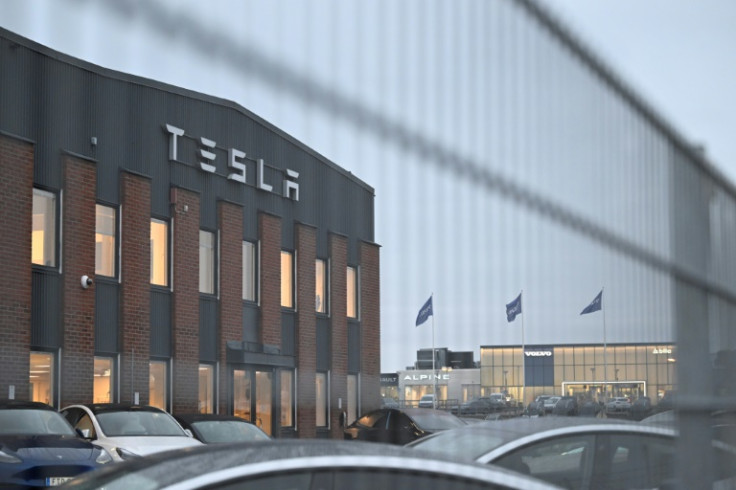Billionaire Elon Musk's Tesla Halts German Production Amidst Shipping Attacks in Red Sea
The production pause brought about by the shipping attacks in the Red Sea may result in the non-production of approximately 5,000 to 7,000 cars.

Tesla, the electric car manufacturer, is set to temporarily cease the majority of production at its Berlin factory for two weeks due to parts delivery delays resulting from attacks on ships in the Red Sea.
The suspension of production, scheduled from January 29 to February 11, comes in response to shipping disruptions in the Red Sea caused by attacks conducted by Iranian-backed Houthi militants.
Tesla's Chief Executive, Elon Musk, has acknowledged that this pause may result in the non-production of approximately 5,000 to 7,000 cars.
The disturbances along this critical shipping route to the Mediterranean, compelling companies to opt for the longer alternative route around the southern tip of Africa, have begun to impact global trade, with a 1.3 per cent decrease reported in December.
The ripple effects of these disruptions highlight the interconnectedness of global supply chains and the challenges faced by companies when relying on specific routes that are susceptible to geopolitical tensions and security threats.
The decision to temporarily halt production underscores the vulnerability of relying on singular supply chain routes, especially in regions facing heightened security risks.
Tesla's move reflects the broader concerns within the automotive industry and other sectors about the reliability of maritime routes crucial for transporting essential components.
The involvement of Iranian-backed Houthi militants in the Red Sea attacks has prompted international concern, leading to increased naval patrols and security measures in the region.
Governments and industry players are grappling with the need to address security issues while concurrently exploring alternative transportation routes to mitigate the impact on production and global trade.
This unexpected development is raising concerns about the vulnerability of global supply chains and the potential impact on the electric car manufacturer's output.
The Gigafactory, situated near Berlin, is Tesla's latest and largest manufacturing facility in Europe, set to play a crucial role in the company's ambitious plans to meet the growing demand for electric vehicles in the region.
"The significantly extended transportation times are introducing disruptions in our supply chains. The conflicts in the Red Sea and the resultant alterations in transportation routes between Europe and Asia via the Cape of Good Hope are impacting production in Grünheide," reported Tesla, the second-largest electric car seller.
In the preceding month, Tesla conceded its position as the leading global electric car manufacturer to its Chinese counterpart BYD. Supported by US investment tycoon Warren Buffett since 2008, BYD, an acronym for Build Your Dreams, surpassed Tesla in sales.
Susannah Streeter from Hargreaves Lansdown analysts remarked that the production pause in Berlin is "a fresh setback to Tesla's production goals and comes amid intense competition from Chinese manufacturers... The China-based automotive giant Geely, owner of Volvo and Lotus, has also indicated potential delays in the delivery of EV models in Europe".
The Red Sea route, providing access to the Suez Canal, constitutes approximately 12 per cent of global maritime traffic. Tensions escalated on Thursday as the US and UK launched air and missile strikes in Houthi-controlled regions of Yemen, aiming to halt attacks on ships navigating the Red Sea.
Industry analysts are closely monitoring the situation, highlighting the interconnected nature of global supply chains and the vulnerability of relying on specific routes for the transportation of goods.
As Tesla grapples with the impact of the Red Sea shipping attacks, the incident highlights the need for increased resilience and flexibility in global supply chains.
The automotive industry, along with other sectors heavily reliant on international trade, faces the imperative to adapt to evolving geopolitical and security dynamics to ensure the continued smooth operation of production facilities and the delivery of goods to consumers worldwide.
Maersk, the shipping conglomerate overseeing 20 per cent of annual global trade movement, opted to reroute its vessels around the southern extremity of Africa last week following attacks on two of its ships in December.
Vincent Clerc, Maersk's chief executive, cautioned on Thursday that the disruptions in the Red Sea might persist for several months.
Describing the assaults by Houthi militants as "brutal and dramatic", he expressed concern that such incidents could contribute to a broader inflationary impact on the global economy.
Retailers are voicing apprehensions, highlighting that ongoing issues in the Red Sea could lead to inflation and availability challenges should container ships continue to be rerouted around Africa.
© Copyright IBTimes 2025. All rights reserved.






















